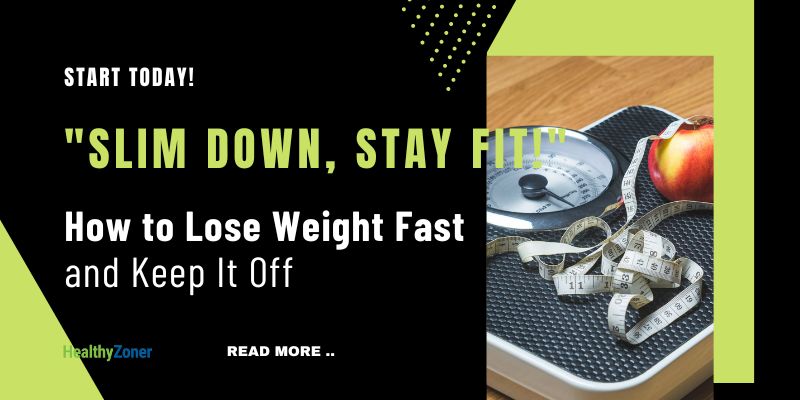
How to Lose Weight Fast and Keep It Off: A Comprehensive Guide
Discover the secrets to achieving your weight loss goals swiftly while ensuring lasting results with our comprehensive guide on “How to Lose Weight Fast and Keep It Off“. From proven strategies to sustainable habits, this guide will empower you to reach your desired weight and maintain it for the long haul.
“Transform Your Body, Sustainably: Your Guide to Lasting Weight Loss”
Are you tired of endless fad diets and quick fixes that promise rapid weight loss but leave you feeling defeated and ultimately gaining back the pounds you shed?
Losing weight fast is a common desire, but maintaining that weight loss can be even more challenging.
However, it is possible to achieve your weight loss goals in a healthy and sustainable way.
Key Points:
- Set realistic goals (aim for 1-2 pounds per week).
- Focus on balanced nutrition with whole foods.
- Practice portion control to avoid overeating.
- Stay hydrated by drinking plenty of water.
- Incorporate regular exercise (150 minutes per week).
- Aim for 7-9 hours of quality sleep each night.
- Manage stress with relaxation techniques.
- Track progress with a journal or app.
- Seek support from friends or a support group.
- Be patient and persistent, focusing on sustainable changes.
In this guide, we’ll explore proven strategies to help you shed those extra pounds quickly and, most importantly, keep them off for good.
- Set Realistic Goals: Before embarking on any weight loss journey, it’s essential to set realistic goals. Aim for a gradual weight loss of 1-2 pounds per week, as this is both achievable and sustainable in the long term.
- Focus on Nutrition: A balanced diet is crucial for both weight loss and overall health. Instead of restrictive diets, focus on eating whole, nutrient-dense foods such as fruits, vegetables, lean proteins, and whole grains. These foods will keep you feeling full and satisfied while providing essential nutrients your body needs.
- Practice Portion Control: Even healthy foods can contribute to weight gain if consumed in large portions. Be mindful of portion sizes and practice portion control by using smaller plates, measuring serving sizes, and avoiding mindless eating.
- Stay Hydrated: Drinking plenty of water throughout the day can aid in weight loss by helping you feel full and preventing overeating. Aim to drink at least 8 glasses of water daily, and opt for water over sugary beverages like soda and juice.
- Incorporate Exercise: While diet plays a significant role in weight loss, exercise is also essential for burning calories and building lean muscle mass. Aim for at least 150 minutes of moderate-intensity exercise or 75 minutes of vigorous-intensity exercise each week, incorporating a mix of cardio and strength training exercises.
- Get Adequate Sleep: Lack of sleep can disrupt hormones that regulate appetite and lead to weight gain. Aim for 7-9 hours of quality sleep each night to support your weight loss efforts.
- Manage Stress: Chronic stress can lead to emotional eating and weight gain. Practice stress-reducing techniques such as meditation, deep breathing exercises, or yoga to help manage stress levels and prevent weight gain.
- Track Your Progress: Keeping track of your food intake, exercise routine, and weight loss progress can help you stay accountable and identify areas for improvement. Consider using a journal or mobile app to track your daily habits and progress towards your goals.
- Seek Support: Surround yourself with a supportive network of friends, family, or a weight loss support group who can offer encouragement and motivation throughout your journey.
- Be Patient and Persistent: Weight loss takes time and patience, and setbacks are normal. Instead of giving up when faced with challenges, stay persistent and focus on making small, sustainable changes over time.
Weighing the Pros and Cons of Rapid Weight Loss Strategies

Here are the pros and cons of the approach to losing weight fast and keeping it off:
Pros:
- Quick Results: Following a structured plan for fast weight loss can provide quick results, which can be motivating and encouraging.
- Improved Health: Losing weight can lead to numerous health benefits, including reduced risk of chronic diseases such as diabetes, heart disease, and certain cancers.
- Increased Confidence: Achieving weight loss goals can boost self-esteem and confidence, improving overall well-being.
- Sustainable Habits: Focusing on healthy eating, regular exercise, and lifestyle changes can lead to long-term weight maintenance and overall improved health.
- Accountability: Tracking progress and seeking support from others can help individuals stay accountable and motivated on their weight loss journey.
Cons:
- Potential Health Risks: Rapid weight loss can pose health risks such as nutrient deficiencies, muscle loss, and gallstones.
- Temporary Results: Quick-fix diets often lead to temporary weight loss, with many individuals eventually regaining the weight once they return to their previous eating habits.
- Metabolic Adaptation: Rapid weight loss can slow down metabolism, making it harder to maintain weight loss in the long term.
- Unsustainable Practices: Extreme dieting methods and overly restrictive eating patterns are often unsustainable and can lead to disordered eating behaviors.
- Emotional Impact: The cycle of losing and regaining weight can take a toll on mental health, leading to feelings of frustration, guilt, and shame.
It’s important for individuals to weigh these pros and cons and consider their own health, lifestyle, and goals when choosing an approach to weight loss. Ultimately, focusing on gradual, sustainable changes is key to achieving long-term success and overall well-being.
Conclusion
By following these tips and strategies, you can achieve your weight loss goals quickly and, most importantly, maintain your progress in the long term.
Remember that sustainable weight loss is not about quick fixes or drastic measures but rather adopting healthy habits that you can maintain for life. With dedication, patience, and perseverance, you can lose weight fast and keep it off for good.
Note: Read more articles on ‘100 Ways to Lose Weight‘.
FAQs
- Q: Can I lose weight fast and keep it off? A: Yes, by making sustainable lifestyle changes and adopting healthy habits.
- Q: How much weight can I lose per week? A: Aim for 1-2 pounds per week for safe and sustainable weight loss.
- Q: Do I need to follow a specific diet to lose weight fast? A: Focus on balanced nutrition with whole foods and portion control.
- Q: What types of exercises should I do to lose weight fast? A: Incorporate a mix of cardio and strength training exercises for effective weight loss.
- Q: How important is sleep for weight loss? A: Adequate sleep (7-9 hours per night) is crucial for weight loss and overall health.
- Q: Can stress affect my weight loss efforts? A: Yes, managing stress is important as it can lead to emotional eating and weight gain.
- Q: Should I track my progress? A: Yes, tracking food intake, exercise, and weight loss progress can help stay on track.
- Q: Is it helpful to seek support from others? A: Yes, having a supportive network can provide motivation and encouragement.
- Q: What if I encounter setbacks on my weight loss journey? A: Be patient and persistent, and focus on making small, sustainable changes.
- Q: How can I maintain my weight loss in the long term? A: Continue healthy habits, stay active, and be mindful of your eating habits.
Explore Further: Weight Loss Insights
- How to Lose Weight through Portion Control and Mindful Eating
- How To Lose Weight by Incorporating Strength Training
- Ultimate Guide: How to Lose Weight and Maintain Muscle Mass

